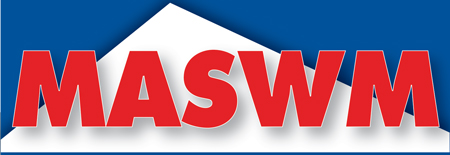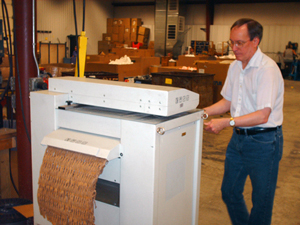
Members | About Workshops | Services for Missourians | News
Dignified and meaningful employment
for people with disabilities

Workshop services provide employment for Missourians and valuable services for local communities.
Rural Shops Face Unique Challenges
While Missouri’s workshops vary in many ways, one of the most dramatic involves the differences between rural and urban facilities.
Stan Shurmantine, executive director of IBS Industries in Independence and Blue Springs, has worked in suburban, urban and rural areas. He says the experience has given him a unique perspective.
"I started in a rural area," he recalled. We used to laugh at these big city ‘fat cats.’ Then I moved to an urban setting and I found that they had challenges of their own."
Shurmantine said it is important for those not directly involved with workshops to understand the different challenges faced by workshops in different areas. "One of the problems of this program from a statewide perspective is that problems are different based on where you are," he said. "The problems in St. Louis are different than the problems in KC. The problems in the urban areas are different than the problems in the rural areas. It’s extremely different for the workshop managers to speak with one voice. The one thing we have in common is that we are regulated by the same people and we must address the legislature for our funding."
Shurmantine said rural workshops face major challenge in simply finding work. "Their problem is that the contracts just aren’t there," he said. "It takes all the initiative you have just to find work. The phrase ‘thinking outside the box’ is overused, but that is what rural managers must do for their workshops to survive. You have to look for non-traditional kinds of work."
Shurmantine said one thing most workshop staffs share regardless of location is the extreme flexibility they must bring to work. "One minute we have to be a manager who can go to the chamber and talk in business terms. Then we have to be a social worker and talk to consumers and parents on the problems that are of interest to them. And you have to understand the personal problems and understand the political process. It’s very challenging."
Both rural and urban workshops face staffing problems, although there are some differences. "In rural areas, the staff is a huge issue. It’s difficult in urban areas, but in rural areas it’s almost impossible. People double up—the secretary deals with programming issues. The driver deals with something else. It’s just that way all the time."
He said the best example of this might be when workshop boards must look for new managers. "Different boards will look for different managers. Some want a nurse, some want a teacher, another want business experience. That is one of the wonderful things about these operations: each board is independent. Each develops its own philosophy."
MASWM The Missouri Association of Sheltered Workshop Managers
If you have questions, please contact:
President Tim Poepsel – (573) 503-0000 or tpoepsel@empacgroupinc.com
or Legislative Chair Kit Brewer – (314) 647-3300 or cbrewer@cuinc.org